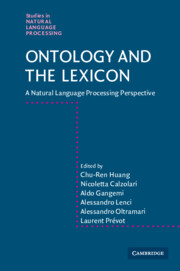Book contents
- Frontmatter
- Contents
- Contributors
- Preface
- Part I Fundamental aspects
- Part II Discovery and representation of conceptual systems
- 6 Experiments of ontology construction with Formal Concept Analysis
- 7 Ontology, lexicon, and fact repository as leveraged to interpret events of change
- 8 Hantology: conceptual system discovery based on orthographic convention
- 9 What's in a schema?
- Part III Interfacing ontologies and lexical resources
- Part IV Learning and using ontological knowledge
- References
- Index
7 - Ontology, lexicon, and fact repository as leveraged to interpret events of change
from Part II - Discovery and representation of conceptual systems
Published online by Cambridge University Press: 06 July 2010
- Frontmatter
- Contents
- Contributors
- Preface
- Part I Fundamental aspects
- Part II Discovery and representation of conceptual systems
- 6 Experiments of ontology construction with Formal Concept Analysis
- 7 Ontology, lexicon, and fact repository as leveraged to interpret events of change
- 8 Hantology: conceptual system discovery based on orthographic convention
- 9 What's in a schema?
- Part III Interfacing ontologies and lexical resources
- Part IV Learning and using ontological knowledge
- References
- Index
Summary
Introduction
A semantically insightful way to describe events of change is in terms of their preconditions and effects. For example, if a car accelerates, the value of the ‘speed’ attribute as applied to the car's motion is higher in its effect than it had been in the precondition of the acceleration event; and if the importance of a certain political theory increases, the value of the modality ‘saliency’ scoping over that political theory is higher in its effect than it had been in the precondition of the increase event. Consider the following examples of change events drawn from the Wall Street Journal corpus covering 1987, 1988, 1989:
Other food stocks rallied in response to the offer for Kraft. Gerber Products shot up 4⅜ to 57¾, CPC International rose 2¼ to 55½, General Mills gained 2⅛ to 54½, Borden rose 1¾ to 56½, Quaker Oats went up 1⅜ to 56⅜ and H.J. Heinz went up 1⅜ to 47¾.
This development follows recent proposals from Saudi Arabia, Kuwait, the United Arab Emirates and Qatar that the current OPEC production ceiling of 16.6 million barrels a day should be increased by 900,000 barrels a day.
In 1985, 3.9 million women were enrolled in four-year schools. Their number increased by 49,000 in 1986.
Interco shot up 4 to 71¾ after a Delaware judge barred its poison pill defense against the Rales group's hostile $74 offer.
[…]
- Type
- Chapter
- Information
- Ontology and the LexiconA Natural Language Processing Perspective, pp. 98 - 121Publisher: Cambridge University PressPrint publication year: 2010

